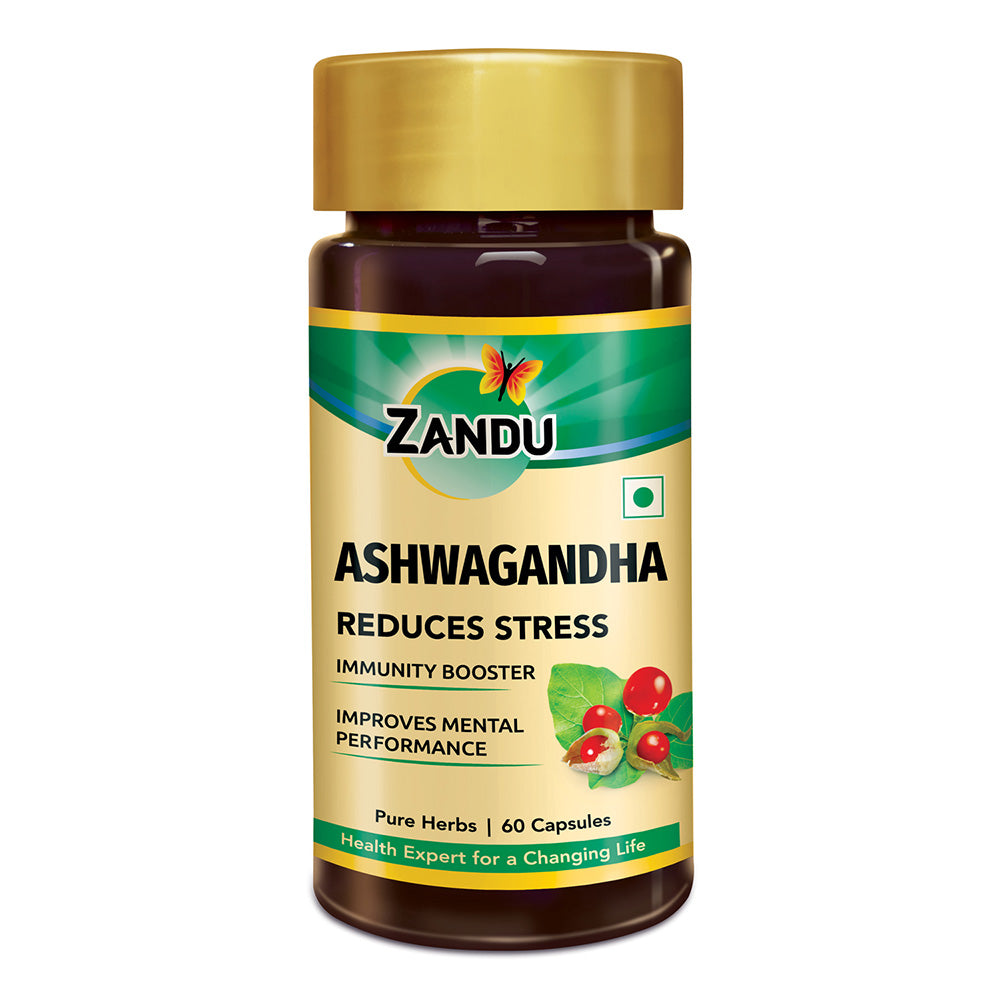
How Long Does Ashwagandha Take to Work? (Scientific Studies)
|
Key insights:
|
Ashwagandha, often called the "king of Ayurvedic herbs," has been revered for centuries for its remarkable health benefits. It's widely popular today, especially among those looking for natural stress, anxiety, and overall well-being remedies. However, one common question arises: how long does Ashwagandha take to work? This article dives deep into Ashwagandha's journey within the body, from immediate to long-term effects, and the Ayurvedic wisdom guiding its usage.
|
Did You Know?
|
What Is Ashwagandha?
An adaptogenic plant, ashwagandha, is utilised in traditional medicine, particularly in Ayurveda. Originating from the root of the Withania somnifera plant, it is well-known for its capacity to regulate stress and balance hormones, indirectly contributing to weight loss.
Often called "Indian ginseng," it is valued for its ability to boost energy, improve sleep, and lessen worry.
How Does Ashwagandha Work?
The bioactive chemicals withanolides in ashwagandha give it its power. Their effects on neurotransmitter pathways and the endocrine system are essential in regulating the body's stress response. This could support mental clarity and calmness while balancing cortisol levels.
How Long Does it Take for Ashwagandha to Show Results?
- It's difficult to say for certain how long it will take. Many factors impact the timeline.
- Research studies usually wait at least 30 days before measuring any effects.
- Most herbal supplements take time to build up in your system before you notice benefits. They aren't fast-acting.
- You might see small changes in cortisol and blood sugar levels within two weeks, but the bigger impacts take longer.
- It can take up to 60 days (2 months) to feel the herb's full effects. Be patient.
- If taken in the morning, you may see modest reductions in daily stress within a few weeks. The effects compound over time.
- When taken at night, it can help sleep within 1 week, similar to low-dose melatonin.
- For anti-anxiety benefits, plan to take it for at least 2 months to allow the compound to build up.
- Timelines range widely based on use, from 7 to 90 days for different benefits.
- Dosage impacts duration and efficacy. Larger doses mean bigger effects. Divide doses throughout the day.
- Talk to a doctor before using, especially in high doses or long-term. Risk of interactions.
- The impacts require patience and consistency. Work closely with your healthcare provider to find the right regimen.
Do check our 100% Ashwagandha Products:
Factors That Influence How Quickly Ashwagandha Works

The effectiveness and speed of Ashwagandha’s benefits depend on various factors, including:
1. Dosage
The amount of Ashwagandha consumed significantly impacts how quickly it works. Standard dosages typically range from 300 to 500 mg of standardised extract taken twice daily. Higher doses may yield quicker results but should only be taken under professional guidance.
2. Form (Capsules, Powder, Tea, etc.)
Ashwagandha is available in many forms, including capsules, powders, teas, and tinctures. Capsules are convenient and often work quickly as they contain concentrated extracts. Powders allow more flexibility in dosage but may take slightly longer to digest.
3. Individual Health Conditions
Each person’s unique health profile, including age, metabolism, and stress levels, influences how quickly Ashwagandha stress medicine works. Those with a balanced lifestyle may experience faster results than those with high stress or other health challenges.
4. Quality of the Herb
Ashwagandha quality is essential for optimal effects. To guarantee constant potency and efficacy, look for supplements that contain premium, standardised extracts. Higher percentages typically imply higher quality, so look for items that specify the percentage of withanolides, the active chemicals in ashwagandha.
5. Length of Use
Most people see obvious results between 2 to 4 weeks, but it takes a few weeks of constant use to start noticing advantages. Some people may take up to six or eight weeks to get the full effects. The best action is to continue with it consistently since patience is essential.
6. Freshness
When it comes to ashwagandha, freshness is important. The active ingredients, such as withanolides, are guaranteed to be at their peak strength while the supplement is fresh. Verify if the packaging's expiration date is still within a reasonable range.
When to Take Ashwagandha?

Ashwagandha is generally safe to take day or night. Nevertheless, based on your objectives and tolerance, you might want to take it in the morning or the evening.Taking in Morning
In contrast to many other supplements and treatments, ashwagandha's advantages take time to manifest. Days or weeks may pass before you start to feel the effects.
For instance, compared to the control group, it took up to 10 weeks for 60 research participants to take 300 mg of ashwagandha daily to fully experience its impact on their sleep quality.
Because of this, deciding when to take ashwagandha is mostly a matter of personal preference. If you're taking other vitamins or supplements for general health, you might want to take ashwagandha in the morning.
However, some people may experience slight gastrointestinal discomfort if they take ashwagandha on an empty stomach. Therefore, ashwagandha may be best taken after breakfast or after a modest snack.
Alternatively, consider including ashwagandha in drinks, smoothies, or other dishes.
Also, do check our detailed guide on using Ashwagandha for Weight Gain.
Taking Ashwagandha in Morning
In contrast to many other supplements and treatments, ashwagandha's advantages take time to manifest. Days or weeks may pass before you start to feel the effects.
For instance, compared to the control group, it took up to 10 weeks for 60 research participants to take 300 mg of ashwagandha daily to fully experience its impact on their sleep quality.
Because of this, deciding when to take ashwagandha is mostly a matter of personal preference. If you're taking other vitamins or supplements for general health, you might want to take ashwagandha in the morning.
However, some people may experience slight gastrointestinal discomfort if they take ashwagandha on an empty stomach. Therefore, ashwagandha may be best taken after breakfast or after a modest snack.
Alternatively, consider including ashwagandha in drinks, smoothies, or other dishes.
Taking Ashwagandha at Night
Ashwagandha powder in moon milk before bed can help you unwind if used to encourage sleep. If you like to take Ashwagandha on an empty stomach, taking it at night can be better than taking it in the morning for those with stomach discomfort.
It's crucial to pick a time that works best for you and when you'll be most consistent in taking it.
How to Know That Ashwagandha is Working
Ashwagandha is an herb that can help you in several ways. After taking it for a few weeks, you may sleep better, have more energy, focus more clearly, and feel less stressed.
Some people also feel more balanced emotionally and have an increased sense of well-being. You may need a different dose or supplement if you don't notice these good effects after some months.
Talk to your doctor if you experience side effects like an upset stomach, nausea, headaches, or rash after taking Ashwagandha.
The best way to know if it helps you is to try to notice any changes. Give it enough time to work, but change the dose or product if necessary. Seeing how your body reacts will show if Ashwagandha is right for you.
Side Effects of Ashwagandha
- When taken as recommended, Ashwagandha is generally considered safe for most people. However, high doses beyond the label may cause stomach upset, diarrhoea, or vomiting.
- Follow the dosage instructions on the product packaging and talk to your healthcare provider before changing doses.
- In rare cases, liver problems have been reported with Ashwagandha supplements, possibly due to contaminants in unregulated products. Purchase from a reputable supplement company.
- Consult your healthcare provider before taking Ashwagandha if you are pregnant, breastfeeding, or taking medications like immunosuppressants, sedatives, or antidepressants.
- There may be potential medication interactions to consider.
Conclusion
From stress relief to improved cognition and general wellness, Ashwagandha has several advantages. Although there may be effects immediately, steady use over a few weeks usually yields the most significant outcomes. You can benefit from this sacred plant by adhering to Ayurvedic recommendations and adjusting your dosage according to specific circumstances. Always get advice from a healthcare professional to ensure that Ashwagandha meets your specific health needs and that you can get the most out of this age-old treatment.
FAQs on Ashwagandha’s Effects
1. How long should I take Ashwagandha for stress relief?
For stress relief, consistent use for eight to twelve weeks is recommended to experience noticeable benefits.
2. Can Ashwagandha help with sleep, and how long does it take?
Yes, Ashwagandha is known to improve sleep quality, especially when taken at night. Most users see improvements in their sleep within four to six weeks.
3. Does Ashwagandha work for everyone?
Ashwagandha may not work the same for everyone due to individual differences in metabolism, lifestyle, and stress levels. Consulting an Ayurvedic or healthcare professional may help tailor its usage effectively.
4. When is the best time to take Ashwagandha for optimal results?
Taking Ashwagandha at night with a warm beverage like milk or water can enhance absorption and align with the body’s natural rhythms.
References:
- Ashwagandha is known for reducing stress and boosting overall well-being. (https://ods.od.nih.gov)
- Some users may notice mild relaxation and reduced stress within a few hours or days, especially if they’re sensitive to Ashwagandha's calming properties.(https://ods.od.nih.gov)
- Long-term benefits may include improved sleep quality, reduced anxiety, increased stamina, and enhanced cognitive function. (https://www.researchgate.net)
- In contrast to many other supplements and treatments, ashwagandha's advantages take time to manifest.(https://www.researchgate.net)







